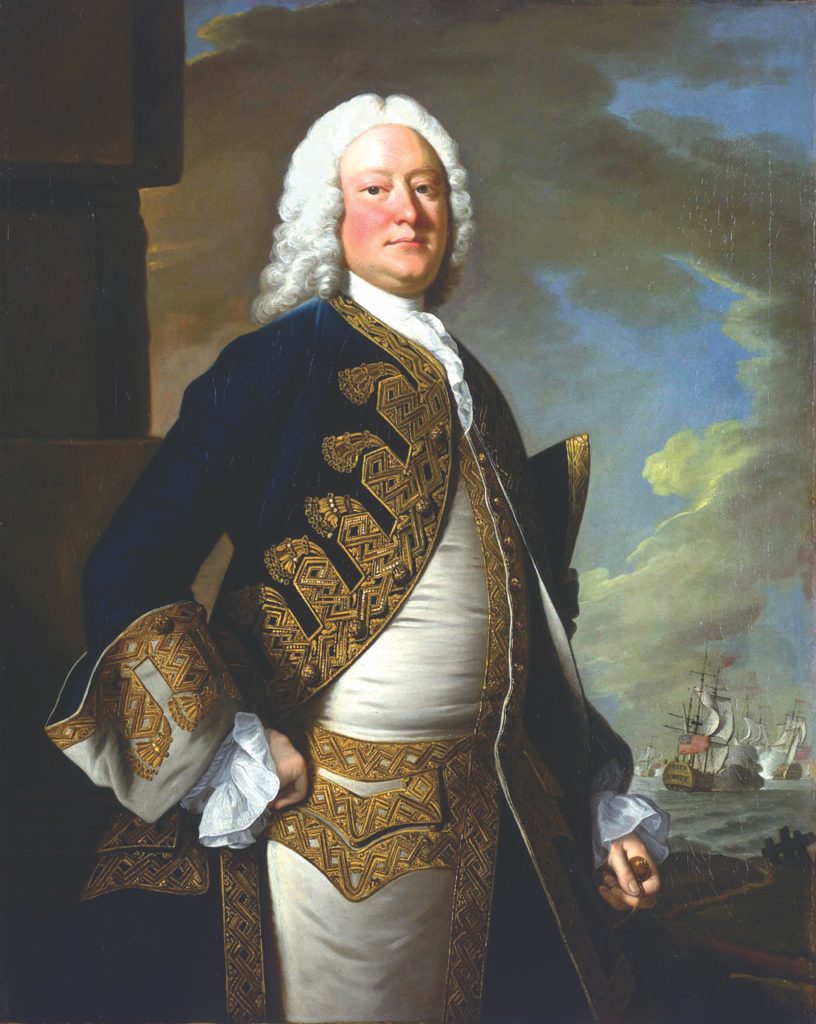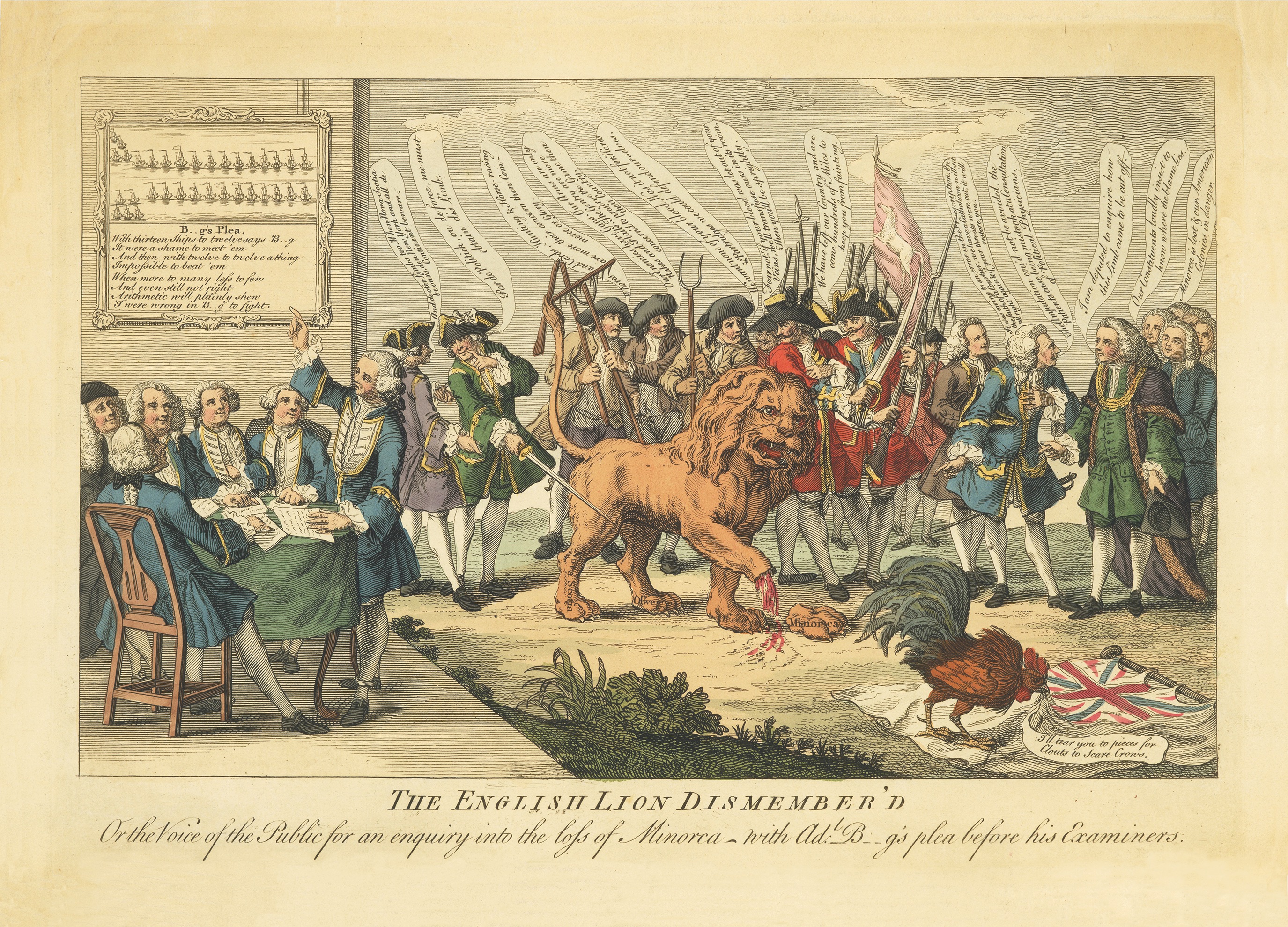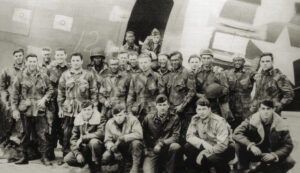In 1756 British admiral John Byng failed “to use all possible means” to stop the French from taking Minorca. He paid for it with his life.
On March 14, 1757, Admiral John Byng was shot by a firing squad of Royal Marines on the quarterdeck of HMS Monarch, then lying at anchor in Spithead, England. Byng was the last British admiral executed by sentence of court-martial, and his case has influenced military law, naval command doctrine, and even literary satire. He was shot not for what he had done but for what he had failed to do.
At the time of his death Byng was a naval officer of nearly 40 years’ service, with 12 years’ experience at flag rank. He was a capable administrator, having held such posts as governor general of Newfoundland and commander in chief of the Royal Navy’s Mediterranean Fleet. He was not, however, a dynamic combat commander—in fact, his career up to the outbreak of the Seven Years’ War in 1756 was noteworthy for the relatively few combat actions he had seen.
Byng was probably not the ideal commander for the events that unfolded in the opening weeks of the Seven Years’ War. The Balearic Island of Minorca in the Mediterranean had been an important British military outpost since its capture in 1708 during the War of the Spanish Succession, and when diplomatic hostilities between France and Britain erupted into yet another war between the two hereditary enemies, the French sent a naval invasion force to take the island from the British.
Byng’s fleet represented the largest British naval force in the vicinity, and in May 1756 the Admiralty ordered Byng to proceed to Minorca’s relief. His instructions included a phrase that would be used against him with fatal effect in the subsequent court-martial: “If you find any attack upon that island by the French, you are to use all possible means in your power for its relief.”
From the outset, Byng was pessimistic about his mission. He argued that the military resources available to him were inadequate if the French were to appear in strength, and he believed that the fortress at Gibraltar was the more important strategic position. With that outlook, he made his first misstep by refusing to reduce Gibraltar’s garrison to augment the main Minorca stronghold of Fort St. Philip. His rationale was that the 700 soldiers he was directed to take to Fort St. Philip’s defense were too few to change the inevitable outcome and that carrying out the order would only result in a needless loss of men and resources.
Arriving at Minorca and finding it menaced by the French fleet, Byng made a half-hearted attempt to communicate with Fort St. Philip’s commander, but he recalled his ships before they had even reached the island. The following day, May 20, Byng engaged the French. Although the two fleets were almost evenly matched numerically, the French had a slight advantage in guns, and in a critical maneuvering decision that would later be called an error, Byng never fully engaged his fleet.
In a short and inconclusive sea battle, the French lost 38 killed and 184 wounded, while British casualties came to 45 killed and 162 wounded. The lead vessels of the British fleet were battered and several capital ships heavily damaged, but others, including Byng’s flagship, never closed to within effective range. After consulting with his senior captains, Byng decided there was nothing to be gained from continuing the fight and sailed back to Gibraltar, leaving Minorca to the French. Fort St. Philip held out against the besieging French for another month before finally capitulating when no other British force came to its aid.

Both the Admiralty and Prime Minister Thomas Pelham-Holles, 1st Duke of Newcastle, were furious when they learned that Byng had essentially abandoned Minorca. Byng was immediately recalled to Britain to face a court-martial. Newcastle seemed determined to scapegoat Byng even before the court-martial convened, telling Parliament that the admiral “shall be tried immediately; he shall be hanged directly.” If Newcastle hoped to distract public opinion from his administration’s inadequate preparations for war by focusing the nation’s outrage on Byng’s conduct, his effort failed. His government fell in November 1756, and he was replaced by William Pitt the Elder.
Byng’s court-martial convened in December 1756, with four admirals and nine senior captains as judges. Charges were proffered against him under the 12th Article of War. If Byng’s bad luck had begun with a mission that sent him out inadequately equipped and insufficiently armed, as he insisted in his defense, he was even unluckier to face a court-martial at this time in the history of British naval law. Eleven years earlier the Articles of War had been revised to stipulate that capital punishment was the only penalty for a commander who was found guilty of having “failed to do his utmost against the enemy” in battle or pursuit. The words that had until then allowed for lesser punishments—“such other punishment as the circumstances of the offence shall deserve and the court-martial shall judge fit”—had been struck from the article.
The 12th Article’s somewhat open-ended phrase—“failed to do his utmost”—proved to be Byng’s undoing. That was the specific wording on which the court found him guilty, though it acquitted him on the charges of “personal cowardice and disaffection.” Even so, the court-martial board reached its verdict with great reluctance because it had no latitude in determining the sentence. Death was the only sentence the law allowed.
The court-martial officers unanimously wrote a decision that asked the Lords of the Admiralty to petition the king for mercy. After all, no British admiral had ever been executed on such a charge before. As prime minister, Pitt did not share his predecessor Newcastle’s personal animosity toward Byng, and he petitioned King George II on the admiral’s behalf, telling the monarch that the House of Commons favored clemency. The king declined to exercise the royal prerogative for mercy, telling his prime minister, “You have taught me to look for the sense of my people elsewhere than in the House of Commons.” The king may have been less concerned with the merits of the appeal than the identity of the politician who was requesting it; considerable political enmity existed between Pitt and the king at that time. The king rejected appeals from other sources as well, including several from the court-martial judges themselves. Two vice admirals of the board of 12 who had convicted Byng flatly refused to sign the death sentence, as did the lord commissioner of the Admiralty, and the entire court recommended that his sentence be commuted. Nonetheless, the king allowed the execution to proceed.
Byng went to his death on a cold, stormy March morning. His coffin was brought aboard HMS Monarch, already inscribed with the words, “The Hon. John Byng, died March 14th 1757.” If Byng had lacked aggressiveness as a combat commander, he certainly did not lack personal composure or courage as he went to his fate. He refused a blindfold but was finally, reluctantly, convinced to accept it on the grounds that it would unnerve the firing squad to see his face as they aimed at him. Byng knelt on a cushion on the quarterdeck, tied the blindfold himself, and held up his handkerchief. He remained in that posture, motionless, for a long, silent moment and then dropped the handkerchief. At that signal, the firing party of six marines fired, killing him instantly.
In the years that followed, Byng was both pilloried and praised in the courts of public opinion and historical memory, with competing epitaphs dedicated to his disputed memory. Byng’s supporters characterized his execution as a judicial murder, and his burial marker declared him to be “a martyr to political persecution.” His case gained lasting recognition when Voltaire, the French author François-Marie Arouet, satirically referred to him in Candide (1759) with the line “Dans ce pays-ci, il est bon de tuer de temps en temps un amiral pour encourager les autres” (In this country, it is good to kill an admiral from time to time to encourage the others.)
Voltaire’s snide remark was surely far more accurate than many in the Admiralty would have wanted to admit. In fact, the Royal Navy had stiffened the penalties of the Articles of War in direct reaction to a perceived lack of dedication to duty on the part of officers in several incidents during the War of the Austrian Succession a decade before Byng’s disgrace. The concept of the “Byng Principle” became an entrenched part of the Royal Navy’s culture for years as a damning phrase that meant “nothing is to be undertaken where there is risk or danger.” British naval commanders were so concerned with this slander that they frequently undertook incredible risks in situations that had little apparent chance of military success, just to prevent the slur being leveled against them, and in so doing achieved amazing victories against very long odds.
In 1759 in the Battle of Quiberon Bay, Vice Admiral Edward Hawke imperiled his entire fleet to engage the enemy despite weather conditions so severe that conventional naval doctrine would have avoided battle. Emerging victorious against both the French and the weather, Hawke wrote, “I can boldly affirm that all that could possibly be done had been done.” It was a mentality that instilled an almost hyperaggressiveness in Royal Navy commanders through the period of the Napoleonic Wars, and from 1757 to 1815 at least half a dozen British naval officers demanded trial by court-martial to clear their reputations of any suggestion that they had failed “to do their utmost” against the enemy. If, as some critics said, John Byng was shot as a grim warning to other officers, the warning seemed to have had its effect.
The legal rigidity that had forced the 1756 court-martial to sentence Byng to death did not long survive him. At the height of the war with the American colonies in 1779, the Royal Navy’s Articles of War were amended to restore to the 12th Article the life-saving words that would thereafter allow military judges to select “such other punishment as the nature and degree of the offense shall be found to deserve.” MHQ
John A. Haymond is the author of Soldiers: A Global History of the Fighting Man, 1800–1945 (Stackpole Books, 2018) and The Infamous Dakota War Trials of 1862: Revenge, Military Law, and the Judgment of History (McFarland, 2016).
[hr]
This article appears in the Autumn 2020 issue (Vol. 33, No. 1) of MHQ—The Quarterly Journal of Military History with the headline: Laws of War | The Scapegoating of an Admiral

Want to have the lavishly illustrated, premium-quality print edition of MHQ delivered directly to you four times a year? Subscribe now at special savings!





